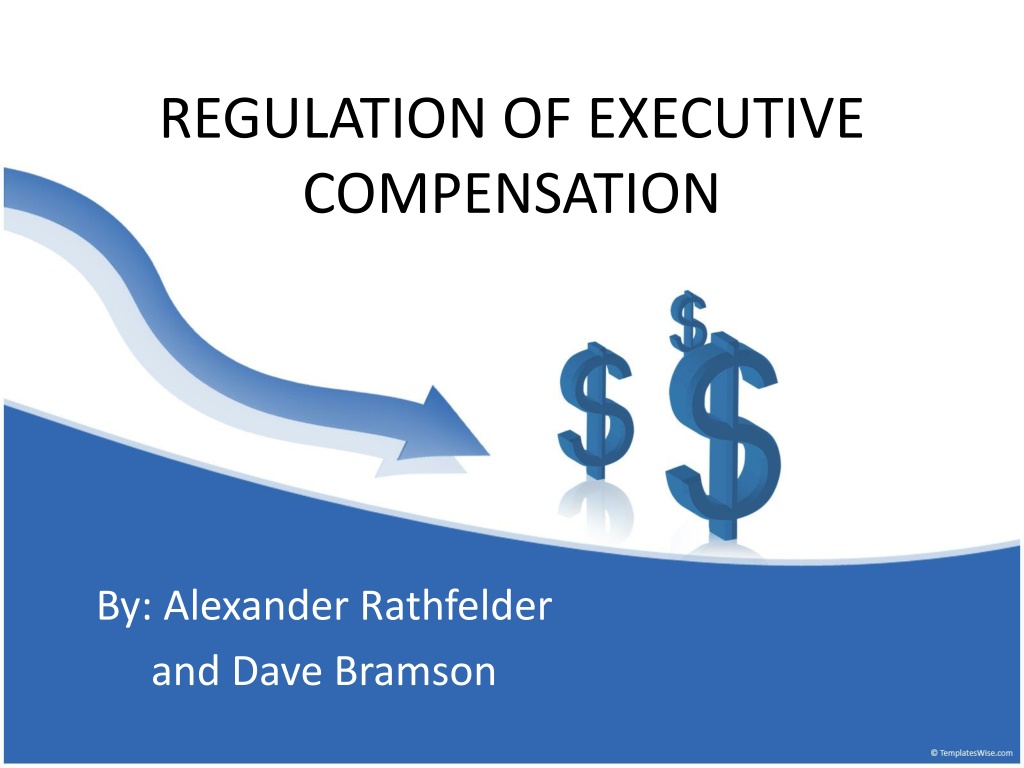Regulation of Executive Compensation in Response to Financial Crisis
This presentation discusses the regulation of executive compensation in the aftermath of the 2007 financial crisis, exploring the need for oversight and control in publicly held companies. It touches on the impact of the crisis on mortgage delinquencies, the role of TARP funds, and the regulations implemented under the ARRA in 2009. The content also presents alternative models and decision-making frameworks to address executive pay issues effectively.
Download Presentation

Please find below an Image/Link to download the presentation.
The content on the website is provided AS IS for your information and personal use only. It may not be sold, licensed, or shared on other websites without obtaining consent from the author. Download presentation by click this link. If you encounter any issues during the download, it is possible that the publisher has removed the file from their server.
E N D
Presentation Transcript
REGULATION OF EXECUTIVE COMPENSATION By: Alexander Rathfelder and Dave Bramson
Financial Crisis/Recession 2007 Increased delinquencies on mortgages, as well as foreclosures. More than 200 financial institutions received funds from TARP (Troubled Asset Relief Program) Financial executive compensation regulated by ARRA (American Recovery and Reinvestment Act of 2009)
Why not other publicly held companies? Executive pay needs to be regulated Incentive Pay Bonuses Golden Parachutes/Severence
Alternatives 1. Establish regulation for executive compensation for all publicly owned firms. Establish regulation for executive compensation for Fortune 500 firms and financial institutions. Do not regulate executive compensation. 2. 3.
BOCR Model Selected Focuses on whether or not to implement a formal regulation Control Criteria Economic Social Political
Sample Subnet Costs Subnets were established for the control criteria with high priority
BOCR Synthesis Ideals Normals Raw Benefits Alternative 1 1.000.000 0.601641 1.000.000 Alternative 2 0.424285 0.255267 0.424285 Alternative 3 0.237835 0.143091 0.237835 Ideals Normals Raw Opportunities Alternative 1 1.000.000 0.621702 1.000.000 Alternative 2 0.439849 0.273455 0.439849 Alternative 3 0.168639 0.104843 0.168639 Ideals Normals Raw Costs Alternative 1 1.000.000 0.463696 0.911739 Alternative 2 0.616782 0.285999 0.562344 Alternative 3 0.539806 0.250305 0.492162 Ideals Normals Raw Risks Alternative 1 0.905197 0.333275 0.884338 Alternative 2 0.810869 0.298545 0.792184 Alternative 3 1.000.000 0.368180 0.976957
Strategic Criteria 1. 2. 3. 4. Public Welfare Economic Welfare Perception of Fairness Future Stability of System
Priorities of Strategic Criteria Normalized By Cluster Limiting Public Welfare 0.48699 0.486993 Economic Welfare Perception of Fairness Future Stability of System 0.11809 0.118094 0.08372 0.083720 0.31119 0.311193
Results Additive (negative) Formula
Conclusion Government should introduce a regulation of executive compensation for all firms. Sensitivity showed that the selection would remain stable except for instances where there is more emphasis on costs.


